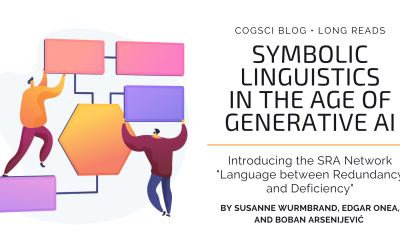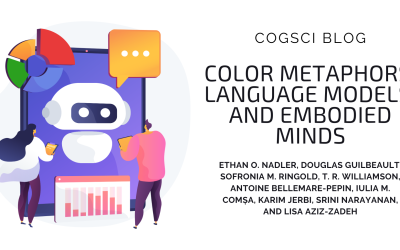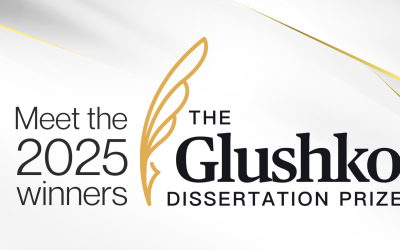The Cognitive Science Society and the Glushko-Samuelson Foundation would like to honor the next generation of cognitive scientists by highlighting this year’s winners of the Robert J. Glushko dissertation prizes in Cognitive Science.
Each year, researchers across many universities are selected for Robert J. Glushko awards for academic excellence in Cognitive Science. The purpose of these awards is to recognize their accomplishments and to encourage their pursuit of interdisciplinary questions about the mind.
We asked a sample of winners to share their research interests and how they got into Cognitive Science. We invite you to learn about these exceptional students and their research in the bios below.
A special thank you to Dr. Robert J. Glushko for his generosity in funding these awards.
2024 Glushko Dissertation Award Winner Highlights
(Alphabetized by Last Name)
 Tianwei Gong
Tianwei Gong
University of Edinburgh
2023 PhD Thesis: “Causal induction in time”
Research interests: I am interested in how people learn causal structures in their everyday life. This can often involve grappling with complex causal systems and complex information formats. My research is motivated by questions like: How do people reason so efficiently and adaptively with limited cognitive resources? How do people gather information by intervening on the causal systems around them, when they often have limited time to think, and limited time to collect evidence? My PhD dissertation explored causal learning from linking events as they occur in continuous time. It aimed to build both prescriptive models of the rational solutions, as well as the descriptive models that better explain how cognitive resources shape human learning process.
Path to Cognitive Science: I was fascinated by the solid methodology of Experimental Psychology as a psychology student, while also wondering how it is that my mind can generate explanations and find ways to test or apply them in my everyday life. The field of causal cognition is perfect for combining these two parts of myself and even introduces me to another solid methodology that I am fascinated by: computational modelling. Since then, I have been exploring these intersections and finding my sense of belonging in Cognitive Science.
 Matthias Grabenhorst
Matthias Grabenhorst
Radboud University Nijmegen
2022 PhD Thesis: “The Anticipation of Events in Time”
Research Interests: I study how brains learn and represent abstract variables, such as probability and time, in the service of flexible behaviour. In my dissertation, I explore the computations underlying temporal anticipation, and found that humans estimate environmental statistics which shapes time estimation and prepares for future action.
Path to Cognitive Science: My professional career began as a Jazz guitarist, with a fascination for time in musical expression. After completing my medical studies, I aimed to better understand how humans interact with their temporal environment which led to my research in Cognitive Science.
 Sean Dae Houlihan
Sean Dae Houlihan
Massachusetts Institute of Technology
2022 PhD Thesis: “A Computational Framework for Emotion Understanding”
Research Interests: I am interested in how we figure out what others are feeling. In my thesis, I computationally modeled how people use diverse types of emotion-relevant information (expressions, behavior & world states) to reason about others’ minds.
Path to Cognitive Science: I decided to study cognitive science after going on a meditation retreat and becoming intrigued by how the mind constructs experience. I started off studying empathic behavior in rats and, while my day-to-day work might look quite different now, the underlying question motivating my current research is the same: how do we figure out what others are feeling and how to help?
 Shailee Jain
Shailee Jain
University of Texas at Austin
2023 PhD Thesis: “Investigating the neurobiology of language with artificial language systems”
Research Interests: My research focuses on jointly understanding language processing in both biological and artificial cognitive systems. Specifically, I build predictive models of language processing in the human brain using artificial neural networks and then use a suite of AI interpretability tools to uncover the computational mechanisms of each system. By taking an interdisciplinary approach spanning neuroscience, cognitive science and computer science, I hope to not only uncover the neural basis of language but also build better AI.
Path to Cognitive Science: Having trained in computer science as an undergraduate, I was thrilled to learn early on in grad school that my background could be useful for studying fundamental problems in biology— like how the human brain comes to think, speak and perceive. This greatly motivated me to develop a research program that uses one system we don’t understand (artificial neural networks) to study yet another system we don’t understand (the human brain).
 Tom McCoy
Tom McCoy
Johns Hopkins University
2022 PhD Thesis: “Implicit Compositional Structure in the Vector Representations of Artificial Neural Networks”
Research Interests: I am interested in understanding how humans and machines process language. In my dissertation, I analyze how AI systems based on neural networks are able to use language so effectively despite the fact that their representations are continuous vectors, which seem incompatible with the structured, symbolic representations that are standard in linguistics.
Path to Cognitive Science: In high school, I participated in a linguistics contest called NACLO (the North American Computational Linguistics Open competition), and I enjoyed it so much that I majored in linguistics in college. My favorite aspects of linguistics were those that connected to cognitive questions, so I then pursued a PhD in Cognitive Science at Johns Hopkins.
 Dominika Radziun
Dominika Radziun
Karolinska Institutet
2023 PhD Thesis “Body perception and brain plasticity in blind and sighted individuals”
Research Interests: My work focuses on understanding the plasticity of body representations, currently from a computational neuroscience perspective, exploring how technologies like hand-extending exoskeletons alter the computations that translate somatosensory input into a representation of the hand. My dissertation investigated body perception and brain plasticity in blind and sighted individuals, addressing questions surrounding bodily awareness and sensory compensation.
Path to Cognitive Science: I have always been captivated by the remarkable adaptability of the brain, finding the concept of brain plasticity incredibly beautiful. Additionally, I am fascinated by how sensory modalities shape our understanding of the world and our own bodies, which has driven my desire to explore these questions within the interdisciplinary framework of cognitive science.
 Hunter Schone
Hunter Schone
University College London
2023 PhD Thesis: “Neurocognitive considerations for engineering bionic limbs”
Research Interests: My research focuses on exploring the capacity for **neural adaptation** to support controlling **next-generation assistive technologies** (e.g., prosthetic limbs and brain-computer interfaces). In my dissertation, I explore the availability (and plasticity) of neural body resources in the human brain, the capacity to modify these resources (following limb amputation or extensive tool use) and how to optimally integrate bionic limbs with the human body.
Path to Cognitive Science: My interest in the unique intersection of cognitive science and bioengineering stemmed from working with upper-limb amputees using prosthetic limbs and their unique neurocognitive experience having to incorporate an artificial prosthetic body-part with their biological body.
CONGRATULATIONS TO ALL ROBERT J. GLUSHKO AWARD WINNERS!
If you are one of this year’s Glushko award recipients, we encourage you to celebrate your achievements. Make a Twitter thread about yourself similar to these student’s highlights and use the hashtag #GlushkoAward

 Tianwei Gong
Tianwei Gong Matthias Grabenhorst
Matthias Grabenhorst Sean Dae Houlihan
Sean Dae Houlihan Shailee Jain
Shailee Jain Tom McCoy
Tom McCoy Dominika Radziun
Dominika Radziun Hunter Schone
Hunter Schone

